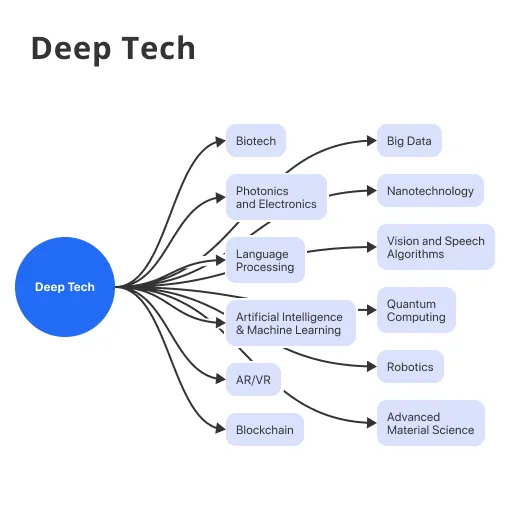What is Deep Tech?
Deep technology refers to game-changing and revolutionary technologies that result from significant scientific or engineering advances. These technologies have the ability to transform businesses, open up new markets, and address major global issues. Deep tech developments, as opposed to incremental improvements, are founded on significant advances in knowledge and capabilities.
Quantum computing is a prime example of deep technology. This technology uses quantum mechanics principles to execute complex calculations at speeds much exceeding those of regular computers. Quantum computing has the potential to revolutionize sectors like as cryptography, drug discovery, and optimization tasks, resulting in breakthroughs in security, medicine, and a variety of other industries.
Why do we need Deep Tech?
Solving Complex Problems
Deep Tech is essential for addressing complex, global challenges, such as climate change, resource scarcity, and healthcare, by providing innovative solutions and breakthrough technologies.
Accelerating Technological Progress
Deep Tech fuels technological progress by pushing the boundaries of scientific knowledge, enabling new discoveries and advancements across various industries and disciplines.
Enhancing Economic Growth
Investing in Deep Tech can stimulate economic growth by fostering the development of new industries, creating high-value jobs, and driving innovation in existing sectors.
Improving Quality of Life
Deep Tech has the potential to improve the quality of life by revolutionizing healthcare, transportation, communication, and other aspects of daily living, making them more efficient and accessible.
Ensuring Global Competitiveness
Embracing Deep Tech is crucial for nations and businesses to remain competitive in an increasingly interconnected and technology-driven world, promoting innovation and long-term success.
The Components of Deep Tech
Advanced Computing
Deep Tech often involves advanced computing techniques, such as high-performance computing, quantum computing, and neuromorphic computing, enabling breakthroughs in complex problem-solving.
Artificial Intelligence and Machine Learning
AI and machine learning are core components of Deep Tech, as they enable the development of intelligent systems capable of learning, adapting, and making decisions based on data.
Robotics and Automation
Deep Tech encompasses advanced robotics and automation technologies, including autonomous vehicles, drones, and industrial robots, transforming industries and improving efficiency.
Biotechnology and Life Sciences
Biotechnology and life sciences are key areas of Deep Tech, focusing on innovations in genetics, personalized medicine, drug discovery, and synthetic biology for healthcare and environmental applications.
Nanotechnology
Nanotechnology, a Deep Tech field, involves the manipulation of matter at the atomic and molecular scale, enabling the development of advanced materials and devices with unique properties.
Internet of Things (IoT) and Connectivity
Deep Tech includes IoT and advanced connectivity solutions, such as 5G networks, low-power wide-area networks (LPWAN), and edge computing, fostering the development of connected, smart systems.
Renewable Energy and Sustainability
Deep Tech also encompasses renewable energy and sustainability technologies, including advanced solar cells, energy storage solutions, and carbon capture methods, addressing global environmental challenges.
Space Exploration and Technology
Space exploration and technology are integral to Deep Tech, focusing on innovations in satellite systems, propulsion, and space-based infrastructure, enabling new opportunities beyond Earth.
The Applications of Deep Tech
Healthcare and Biotechnology
Deep tech has the potential to revolutionize healthcare and biotechnology through applications such as gene editing, personalized medication, and better diagnostics. These breakthroughs have the potential to result in more effective treatments, improved patient outcomes, and a better understanding of complicated diseases.
Environmental Sustainability
Innovations in deep tech can significantly contribute to environmental sustainability by developing clean energy sources, reducing waste, and minimizing resource consumption. Examples include advanced materials for energy-efficient buildings, carbon capture technologies, and smart agriculture systems.
Artificial Intelligence and Robotics
Deep technological developments in artificial intelligence (AI) and robotics enable the development of complex algorithms and self-driving devices. These technologies are utilized in a range of industries, including manufacturing, logistics, and customer service, to boost efficiency and production.
Quantum Computing
In solving complex problems, quantum computing, a deep tech field, has the potential to vastly outperform traditional computing. Cryptography, drug discovery, and optimization tasks are among its applications, which can lead to breakthroughs in security, medicine, and other industries.
Transportation and Mobility
Deep tech innovations can transform transportation and mobility, with developments such as autonomous vehicles, electric propulsion, and advanced traffic management systems. These technologies can improve safety, reduce emissions, and optimize traffic flow in urban environments.
Space Exploration and Satellite Technologies
Deep tech plays a crucial role in advancing space exploration and satellite technologies. Innovations in propulsion, communication, and remote sensing can enhance our understanding of the universe, enable more efficient satellite operations, and open up new opportunities for space-based services.
The Deep Tech Ecosystem
Research and Academia
The deep tech ecosystem is driven by cutting-edge research and academic institutions, where scientists and engineers work on groundbreaking discoveries and advancements in various fields, such as AI, biotechnology, and quantum computing.
Startups and Entrepreneurs
Innovative startups and entrepreneurs play a crucial role in the deep tech ecosystem by taking promising research and turning it into practical applications and products, driving the commercialization of deep tech innovations.
Investors and Venture Capital
Investors and venture capital firms provide essential funding and support to deep tech startups, helping them bring their innovations to market. They recognize the potential of deep tech to disrupt industries and generate significant returns.
Large Corporations
Established companies are increasingly investing in deep tech, either by acquiring startups, forming partnerships, or conducting their own research and development. They aim to stay competitive and capitalize on the transformative potential of deep tech innovations.
Government and Policy
Governments play a key role in shaping the deep tech ecosystem by providing funding, establishing supportive policies, and fostering collaboration between academia and industry. They recognize the importance of deep tech for economic growth and societal progress.
Incubators and Accelerators
Incubators and accelerators support deep tech startups by providing resources, mentorship, and networking opportunities. They help entrepreneurs navigate the unique challenges of developing and commercializing deep tech innovations.
The Challenges with Deep Tech
Funding and Investment

Deep tech ventures often require substantial funding to support research, development, and commercialization. Securing adequate investment can be challenging, as these projects may involve higher risks and longer time horizons than traditional startups.
Talent and Expertise
Deep tech projects typically require specialized knowledge and expertise in advanced scientific and engineering domains. Attracting and retaining skilled talent can be difficult, especially in highly competitive markets or when facing a shortage of qualified professionals.
Regulatory and Legal Hurdles
Deep tech innovations may face regulatory and legal challenges, as they often involve novel technologies or applications that existing regulations may not adequately cover. Navigating complex regulatory landscapes can be time-consuming and costly for deep tech ventures.
Technology Adoption and Market Acceptance
Introducing disruptive deep tech solutions to the market can be challenging, as it may require overcoming resistance to change, educating potential users, and demonstrating clear benefits over existing solutions. Achieving widespread adoption and market acceptance can be a slow and difficult process.
Intellectual Property Protection
Protecting intellectual property (IP) is crucial for deep tech ventures, as their value often lies in unique, groundbreaking technologies. Ensuring robust IP protection can be complex and expensive, particularly when dealing with international patent laws and potential infringement issues.
Collaboration and Ecosystem Development
Deep tech innovation often requires collaboration between various stakeholders, including academia, industry, and government. Establishing strong partnerships and fostering a supportive ecosystem can be challenging, but it is essential for driving deep tech advancements and overcoming barriers to success.
The Future of Deep Tech
Emerging Technologies
As research and development continue, new and exciting Deep Tech innovations will emerge, further expanding the boundaries of human knowledge and capabilities.
Integration with Traditional Industries
Deep Tech will continue to transform traditional industries, driving innovation and creating new business opportunities.
Global Impact
Deep technology has the ability to address some of the world's most serious issues, including climate change, food security, and healthcare. We can create a more sustainable, egalitarian, and affluent future for everybody by harnessing the potential of Deep Tech.
Frequently Asked Questions

What is Deep Tech?
Deep Tech refers to cutting-edge technologies based on scientific discoveries, engineering innovations, or profound advancements in computing and data analysis.
What are some examples of Deep Tech?
Examples of Deep Tech include artificial intelligence, quantum computing, biotechnology, nanotechnology, and advanced materials science.
How is Deep Tech different from other technologies?
Deep Tech often involves complex, long-term research and development, addressing fundamental problems or creating breakthrough solutions with significant impact.
What industries can benefit from Deep Tech?
Deep Tech has the potential to transform various industries, including healthcare, energy, transportation, agriculture, manufacturing, and information technology.
What are the challenges in developing Deep Tech?
Challenges in developing Deep Tech include high R&D costs, long development cycles, regulatory hurdles, and the need for specialized expertise and interdisciplinary collaboration.

